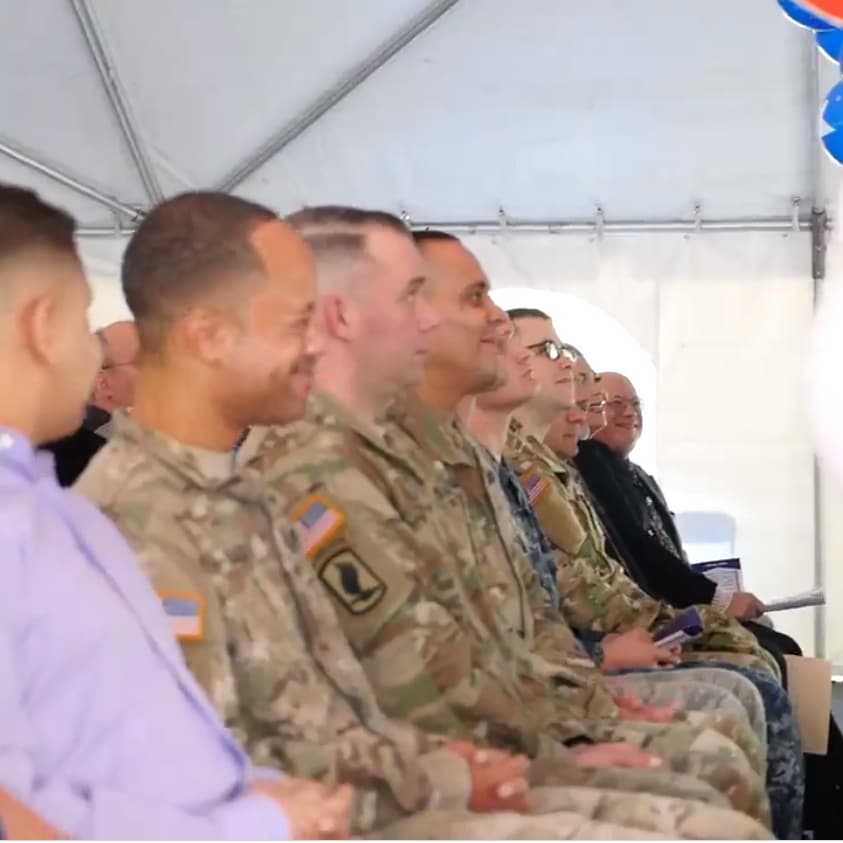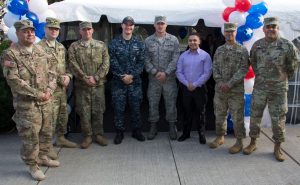

Special visitors joined Local 66 leadership for the graduation: Joseph Sellers, Jr., general president of the International Association of Sheet Metal Air, Rail and Transportation Workers (SMART); Joseph Lansdell, president of Sheet Metal and Air Conditioning Contractors’ National Association (SMACNA); James Page, administrator for the International Training Institute (ITI) for the unionized sheet metal, air conditioning and welding industry; Charles Mulcahy, SMART director of contractor affairs; Cyrus Habib, Washington’s lieutenant governor; Vincent Sandusky, CEO of SMACNA; Angela Simon, vice president, SMACNA; Bruce Dammeier, Pierce County executive; Rachel Roberts, Washington State Veterans Affairs; Don Steltz, Local 66 Western Washington JATC administrator; Tim Carter, Local 66 Western Washington business manager; and more.
Launched Aug. 15, the SMART Heroes Program was established to provide free sheet metal industry training to enlisted U.S. Military men and women who plan to enter civilian life within the year, thereby assisting in a successful transition into the civilian workforce.
“They deserve that opportunity, and we’re happy – fortunate – to be able to give it to them,” said Sandusky, who added that military veterans have many qualities any employer would be happy to have – a sentiment echoed by all of the program’s leaders. “We’ve got people who understand what it takes to get things done,” he said.
“Military veterans have the ideal qualities we look for in candidates for our apprenticeship programs — work ethic, maturity and discipline, to name a few,” Page said. “Their skills acquired during their time of service can easily be applied on the work site, and it is our honor to assist these U.S. heroes as they transition to civilian life.”
The ITI, which develops the curricula for more than 150 sheet metal training facilities across the United States and Canada, developed a training program specifically for veterans transitioning from service, and all training is focused on areas experiencing the greatest market demand: industrial/welding, architectural, testing, adjusting and balancing (TAB) and detailing.
“I don’t know a contractor out there who wouldn’t want your skills,” Lansdell told the graduates during the ceremony. “You’re going to be a leader of the pack.”
Adjacent to Joint Base Lewis-McChord, the Western Washington Sheet Metal JATC seemed the ideal host for the inaugural SMART Heroes class.
While seven of the graduates work out of McChord, Trey Freitag of the U.S. Navy drove 40 minutes from the Navy’s Bremerton base every day for a 6 a.m. start time.
“That’s the value he places on this,” said Gary Olson, a career coach and teacher with Insignia Federal Group, which administers the Military’s Transition Assistance Program.
“It’s great to see the enthusiasm,” Sellers said. “It reminds me of the enthusiasm I had when I was an apprentice.”
During his speech at the ceremony itself, Sellers told the graduates, “It will be a great career for you, as it has been for me.”
Surprisingly to some, graduates were of all military ranks and years of enlistment: Richard Quintana, U.S. Army, 27-plus years of service; Freitag, five-plus years of service; William Castillo, U.S. Army, 19 years of service; Juan C. Perez, U.S. Army, four-plus years of service; Joshua Buckley, U.S. Army, nearly 12 years of service; Barry Barker, U.S. Army, 23 years of service; Ethan Eastling, U.S. Air Force, nearly six years of service; Ryan Arce, U.S. Army, two years of service.
“That sends a really strong, powerful message – that we have folks transitioning out of the military, not just who are young men early in their military career, ready to go start a new career, but people who have had very successful careers in the military and are about to embark on another very successful career,” Dammeier said during the graduation.
“This program is probably the most excellent fit to one of the biggest industry problems we have: finding qualified workers,” Lansdell said.
SMART established the program with SMACNA, in collaboration with the ITI, SMART Local 66, SMACNA Western Washington, Western Washington Sheet Metal JATC and Helmets to Hardhats. The McChord Field Education & Training Center provided support to the program by helping identify and screen potential candidates.
“This is a model for our entire country,” said Habib, who noted how difficult it can be to get numerous organizations to work together, which can be confusing for veterans trying to navigate through it all as they transition to civilian life. “It gives me so much joy to see that happening here.”
Dammeier echoed Habib’s sentiments on the importance of partnerships.
“This is a significant partnership between labor and management, coming together to deliver not only for their industry, but also for you, and everybody who follows you, who has served our country well and now is looking to move onto that next phase of life,” he said to the graduates.
While still enrolled in (and, thus, paid by) their respective military branch, program participants complete a seven-week course to receive the equivalent of their first-year sheet metal apprentice training (224 hours).
“Thirteen months ago, this was just a vision,” Sellers said. “Now that vision is a reality.”
Not only is it a reality, but it’s moving full-steam ahead. Thanks to word of mouth, the next class, which will begin Oct. 17, is at capacity with 15 enrollees.
Upon discharge from service, these graduates may choose to enter any of the 150-plus SMART apprenticeship programs in the United States and be provided direct entry and advanced placement as a second-year sheet metal apprentice, including a high probability of obtaining second-year apprentice wages and benefits.
“Some [members of the military] have never interviewed for a job before,” Olson said. “Can you imagine the stress this takes off their shoulders?”
Sellers spoke along similar lines.
“We took that brick out of their backpack,” he said.
Nearly 250,000 service members transition out of the armed services every year. Many of these veterans have an interest in the building and construction trades and have registered with the Helmets to Hardhats program. It is the intent of the SMART Heroes Program to work closely and cooperatively with Helmets to Hardhats to ensure veterans have a broad selection of construction trades available to them if they complete the program and decide the sheet metal industry is or is not the correct fit. Therefore, the initial step for military personnel who are interested in the SMART Heroes Program is to first register with Helmets to Hardhats.
Upon the ongoing success of Western Washington’s SMART Heroes program, SMART Heroes’ creators intend to pursue SMART Heroes program partnerships with military bases throughout the country.
Related News
- Resolve to Keep Your Timebook Current in 2026
- Victory in Chicago as SMART-TD Helps Establish New $1.5 Billion Transit Agency
- New Jersey Train Length, Crew Size Law Awaits Governor’s Signature
- CSX Conductor, Single Mother Devastated in Head-on Collision
- GP Coleman’s 2025 holiday message to members
- SOFA Safety Alert
- AJFL Scholarship Application Opens Soon
- SMART-TD Applauds FRA and DOT for Strengthening Cross-Border Rail Safety Protections
- Michigan sheet metal worker details impact of canceled project
- Regional Training Seminars coming to St. Paul, Baltimore in 2026